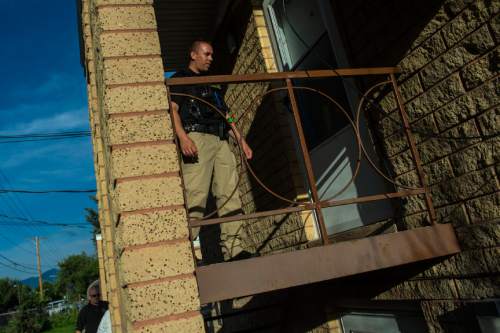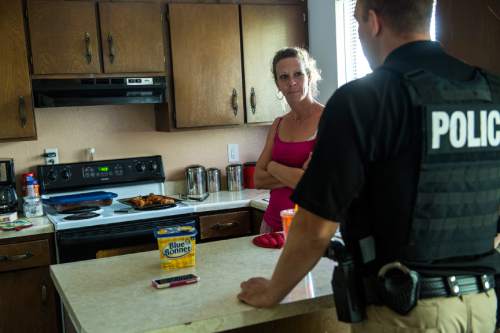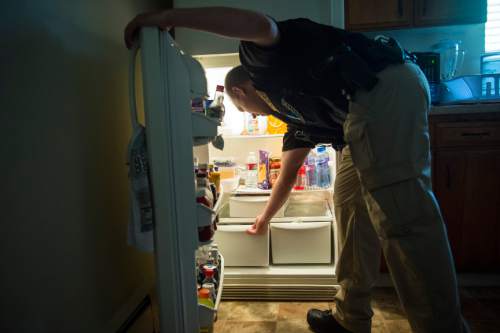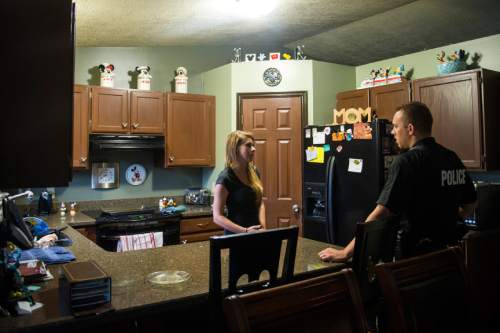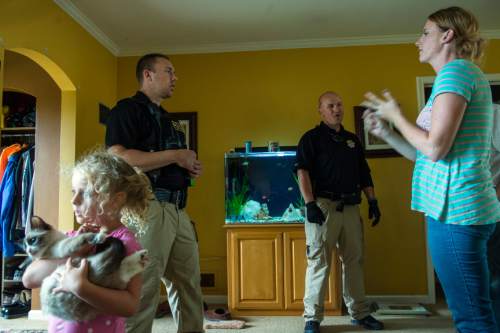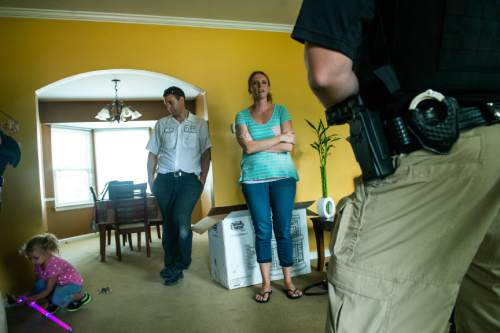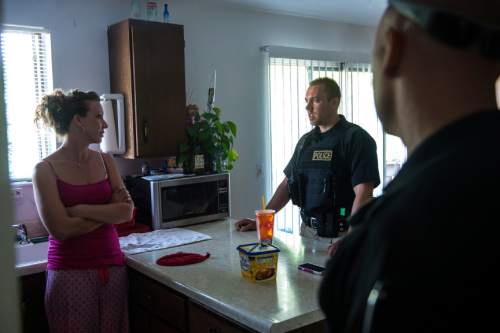This is an archived article that was published on sltrib.com in 2014, and information in the article may be outdated. It is provided only for personal research purposes and may not be reprinted.
Riverton • She told them to drop in anytime, so Adult Probation & Parole agents Nathan Griffiths and Chris Moore arrived unannounced in an unmarked car that they parked down the road.
The garage door was open. Two young boys played in the grass. As the officers approached, 5-year-old Kayden eyed the black guns on their belts, tucked neatly under their bulletproof vests.
"Want to see mine?" he asked. "It shoots rubber bands."
Inside the house, Brandi Corso was drying her eyes.
Corso, 23, is a recovering drug addict and a convicted shoplifter. She's been to jail, and she doesn't want to go back. Her home life is strained, the demands of her probation stressful.
And, on Thursday, Corso's grandmother died.
But she had told them to drop by anytime, so she smiled big as she invited in the officers.
Moore is Corso's probation officer. Every week, he conducts random checks on the female offenders whose cases he's been assigned. It's part of the deal: random home visits, searches, drug tests. He'd never before found Corso at home.
"Glad we caught you," Moore said. "How've you been?"
Corso's voice cracked before she could form the words: "My grandma died this morning."
Moments later, she was standing in the kitchen crying as Moore listened thoughtfully, his head tilted slightly to one side. He asked when the last time was that Corso saw her grandmother. Had they had a chance to say goodbye?
In that moment, it didn't matter that Moore was carrying a weapon or wearing a vest, that his badge gave him license to search Corso's home or toss her back in jail for doing something wrong. He was employing what AP&P officials have found is one of the most effective strategies in dealing with female offenders:
Listening.
In the past year, AP&P has begun to use new methods in dealing with probationers and parolees — several of which are gender-specific. And Director Geri Miller-Fox said they're seeing results.
"I want a safe community, but what we've been doing doesn't seem to really accomplish that objective," Miller-Fox said. "Citizens need to ask more of its correctional system. They should look to us to make sure that when we release offenders, they are coming back a safer, better-contributing member of society."
—
A revolving door • Of all the people who end up in Utah's prisons, the majority of them haven't committed a new crime — they land there because they violated the terms of their probation or parole.
According to a study by Pew Charitable Trusts, offenders who failed to abide by the conditions set by a judge or the Utah Board of Pardons and Parole accounted for two-thirds of new prison admissions last year.
These re-entries contribute to an overall growth in Utah's prison population — even amid a national decline.
Between 2009 and 2012, the nation saw a 4 percent drop in incarcerations, according to the Pew study. Utah had 6 percent growth.
Meanwhile, the number of Utah parolees and probationers who were successfully discharged fell significantly over the past 10 years. Nearly half will return to prison within three years of their release.
"Once a person becomes an inmate in jail or prison, they take on a whole new set of issues just by nature of being incarcerated," Miller-Fox said. "So, for years in criminal justice, we've focused on the transition to re-entry, but now our focus is more on success after re-entry. How can we get you to be as successful as we can? How can we steer you away from the system so you're not reoffending?"
A new program instituted late last year targets women specifically. It's called the Female Offender Success Initiative (FOSI) and involves an assessment with more than twice the number of questions as the one used for men. The FOSI agents are assigned exclusively to female probationers or parolees.
"What we're seeing is it's already having an impact on the numbers," Miller-Fox said. "The last I looked, we're at an eight-year low for probation commitments to prison."
That's good news for Utah.
Last year, the number of women sent to prison for violating probation jumped 180 percent in the first quarter of 2013, compared to the same period in 2012. It mirrors a national trend of more women ending up behind bars.
Experts point to drug policies and a "scare them straight" approach as some of the driving factors behind the increase — women tend to receive harsher penalties than men for the same crimes.
Miller-Fox added that women tend to be "higher need, but lower risk" to violate parole or probation than their male counterparts.
What that means is they tend to require more help — a significant number of female offenders are also mothers — but are less likely than men to commit another crime if they're given that support.
"Females have a different mind-set than males, so we treat them differently," said Moore, who works exclusively with female offenders. "It's much more personal, much more, 'If you have a problem give me a call.' And after a while, you become one of the first people they call. Sometimes all they need is that stability, that little extra help."
Earlier this year, Gov. Gary Herbert called for an end to the "revolving door" of the prison system. He created a task force, called for community input, asked for results.
AP&P has responded by instituting a hard and fast goal: a 25 percent drop in recidivism by 2017.
It's not just ambitious, it's unusual.
"It makes a lot of administrators nervous, putting numbers out there like that," Miller-Fox said. "But it's a part of helping us have a target that we can move our organization toward. It lets us know where we want to go. And I believe we can get there."
A lot will need to change in Utah before that goal can be met, she added.
To start, AP&P is training its officers to be more responsive to the individual needs of offenders. They're encouraging more comprehensive risk assessments and "competence building," emphasizing drug and mental health treatment over trying to scare people straight.
Sometimes, Miller-Fox said, the road to an offender's recovery will start simple. Sometimes it's as simple as having someone who listens.
—
The agents • Moore is responsible for about 50 women on probation.
Each has a different story, different needs and different requirements — treatment, counseling, parenting classes, community-service hours, getting high school diplomas or college degrees, restitution, fines.
Most are addicts. Several have a history of trauma and abuse. None is allowed anywhere near drugs, alcohol, weapons or other known criminals.
So, every week, twice a week, Moore goes to knock on doors, dropping in unannounced to see where and how the women are living. He usually hits a handful of houses a night — rarely more than 10 — and often fewer than half the women are home.
Griffiths, the assistant administrator for AP&P's Region Three office, doesn't go out into the field as often as he used to. But he still knows what signs to look for:
"You smell the air, try to see who's in the house, if there are kids in the house. You listen for noises, try to figure out what — if anything — is going on in the other room. Basically, you try to be aware of everything, every little detail," Griffiths said. "One of the fun challenges of the job is figuring out did we just catch this person off guard or are they trying to hide something?"
During Thursday's rounds, Griffiths acted as backup, ensuring the area was clear, and staying on the lookout for people coming and going from anywhere but the front door.
They've seen it all: People running out of back doors, bathrooms, windows.
They've walked in on offenders mid-drug deal, mid-drink, smelled the scent of marijuana lingering in the air.
They know when someone's nervous. They can tell when someone's home, but pretends not to be.
They sometimes spend hours just waiting in the dark, waiting to see who's coming and going from an offender's home.
Despite all this, they insist, they don't like playing "gotcha!"
The two self-described optimists said they'd rather find nothing amiss and see people succeed.
"No matter how bad they think they have it, they can change everything about their lives," Moore said. "I let them know I want to see them succeed — our entire goal is to help them."
—
Back on track • It can be hard for probationers and parolees to imagine what success looks like.
For some, whose only friends, only support systems involve other felons, success can mean leaving everything they've ever known, losing friends, going it alone.
"Sometimes you have ones who come into your office crying because they don't know what to do, they don't know where to start," Moore said. "So you work on small things first. You give them little goals — do one thing for me this week, do one thing for me next week. Eventually, you see them doing it on their own."
Elisa Kelly, 29, has been in and out of the system for almost a decade. She struggled with drugs and alcohol. She temporarily lost custody of her kids.
Sometimes, Moore said, it takes time for a person to decide when enough is enough.
On Thursday afternoon, Kelly was giving her two youngest daughters a bath as her oldest brushed her hair and her two sons played in their West Valley City home.
She's been complying with her probation, staying in treatment and is set to graduate from drug court by month's end. She has plans to go back to school, get a degree.
On the wall, she wrote a list of "House Rules" for her five kids.
"It's been hard breaking them from the cycle of how I was raising them before," she said. "I got to tell them to use nice words and behave. It's kind of nice though. It feels good making everything work."
She's a single mom. The father of her children was sent back to prison for violating the terms of his release. But, she said, she's not worried about it.
"It's good, it's a good thing," she said.
"When he's around, he just messes with their emotions. They need more stability than that."
She's one of Moore's success stories.
"If you can build up someone's self-esteem, that's the first thing," Moore said. "You need to help them believe that they can do this."
mlang@sltrib.com Twitter: @Marissa_Jae



